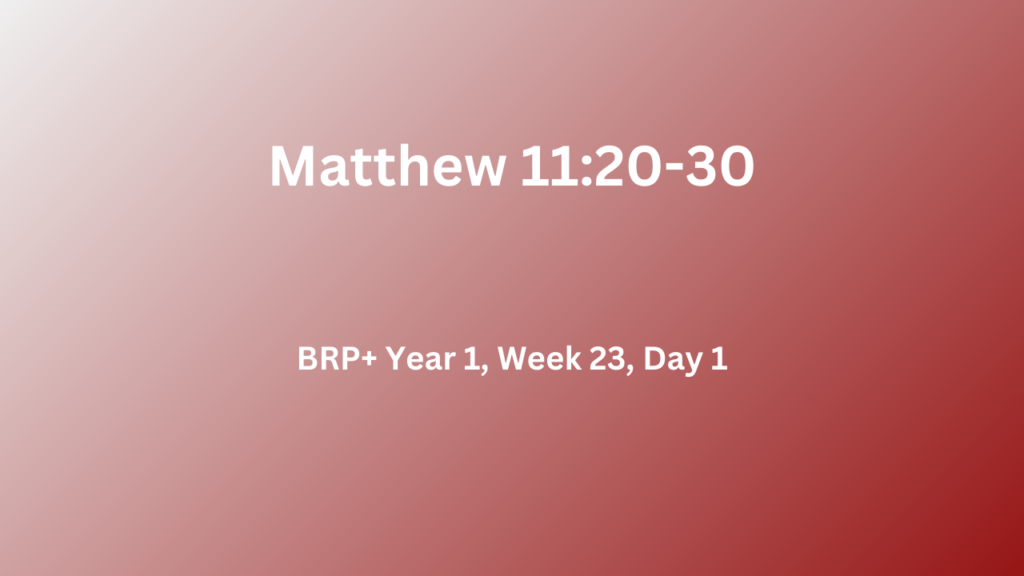Matthew 11:20-30
Q.1. Did Jesus expect His miracles to bring repentance? What had happened to Tyre and Sidon? Will all the ungodly be punished the same? – (Mt.11:20-24 c.f. Ezk.26-28)
After commissioning the Twelve, Jesus taught around the cities near Galilee (see Mt.11:1). He had told John the Baptist’s disciples to tell John – the blind receive their sight and the lame walk, the lepers are cleansed and the deaf hear, the dead are raised up, and the poor have the gospel preached to them (Mt.11:5). Even though all these things had happened, the people had largely rejected the ministries of both John the Baptist, and of Jesus (see Mt.11:18-19). Jesus’ miracles were proof that He was the promised Messiah. His preaching of repentance should have been heeded (see Mt.3:2; 4:17). The inference from Jesus was that if the confirmation of His Messiahship had been presented to Tyre, Sidon, and Sodom, those people would have repented and survived. Therefore, the hard-hearted responses of the cities of Chorazin and Bethsaida were inexcusable (Mt.11:20-24). The key point that Jesus was making, was that besides the judgments already poured out on Tyre and Sidon, there is an ultimate judgment yet future (see Rev.20:11-15). This will be more severe for those who have rejected a viable presentation of the Gospel. Tyre and Sidon had been great trading nations who attracted conquest from both the Babylonian and Greek Empires. Ezekiel described the final rise and fall of Tyre and Sidon. Ezekiel chapter 28 alludes to the destruction of Lucifer. These prophecies point to the eventual triumph of God over Satan, and over those who do his bidding (see Revelation chapters 17-20). Jesus seemed to indicate that the severity of His judgment will depend upon how people respond to the light which they have been given (see Mt.11:22-24 c.f. Lk.12:42-48).
Q.2. What advantage do infants have over ‘the intelligent’? What is involved in getting to know God? What offer did Jesus make to earnest seekers? – (Mt.11:25-30)
No doubt, amongst the crowds were children who loved being with Jesus. He spoke to His Father – 25 … I praise You, Father, Lord of heaven and earth, that You have hidden these things from the wise and intelligent and have revealed them to infants. 26 Yes, Father, for this way was well-pleasing in Your sight (Mt.11:25-26). Pride in our intellect can prevent us from coming to the Saviour. However, God has ordained that to come to Him, we require the true humility that children display. The opportunity for a relationship with God is a gift entirely from Him. With the humility of a child, we need to respond honestly to the revelation and the offer He has given – All things have been handed over to Me by My Father; and no one knows the Son except the Father; nor does anyone know the Father except the Son, and anyone to whom the Son wills to reveal Him (Mt.11:27). Does God make it hard to approach Him? Here we see Jesus making a broad appeal to all who will listen – Come to Me, all who are weary and heavy-laden, and I will give you rest (Mt.11:28). He offers us peace and rest. A yoke was made of wood, shaped, or carved to fit around the necks of two cattle, oxen, or other beasts of burden, allowing them to plough, and pull heavy loads or carts. Jesus called the people to – take My yoke upon you and learn from Me, for I am gentle and humble in heart, and you will find rest for your souls (Mt.11:29). He understood that everyone is carrying a yoke, but promised – My yoke is easy, and My burden is light (Mt.11:30). Jesus described Himself as being – gentle and humble in heart. Not only does He, as God, help us carry our yokes, but His yoke is characterised by gentleness and humility. The paradox is that the offer of Jesus is to all who will listen and yet is available to – anyone to whom the Son wills to reveal Him (Mt.11:27 c.f. Rom.10:13; 2 Tim.2:19).

